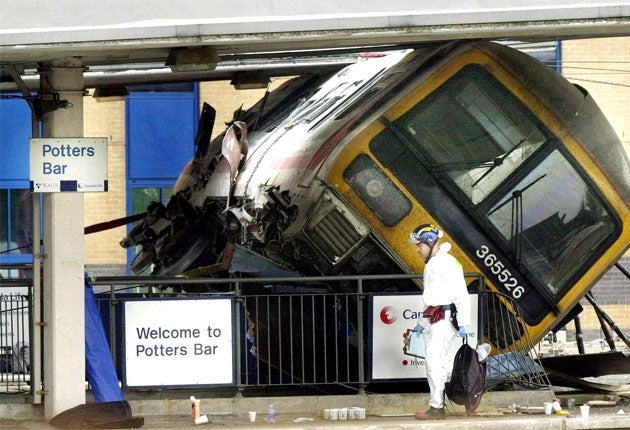Warnings about Potters Bar line 'were ignored'
Inquest begins into rail crash eight years ago that killed seven people

Concerns about "rough rides" at Potters Bar were raised by two passengers the night before the 2002 rail crash which killed seven people, an inquest heard yesterday.
One of the commuters, an employee of West Anglia Great Northern railway, raised the issue with fellow members of staff, but they either ignored or misinterpreted his concerns. Another passenger reported "violent lurches" on the same stretch of line, but his complaint was also never investigated.
The missed warnings were revealed at the full inquest that began in Hertfordshire yesterday, more than eight years after the crash that killed Austen Kark, Emma Knights, Jonael Schickler, Alexander Ogunwusi, Chia Hsin Lin, Chia Chin Wu and Agnes Quinlivan on 10 May, 2002.
The jury heard that Terence Moore, a train announcer, had been travelling home the night before the crash when he noticed "jolting" and "movement" as the train passed through Potters Bar at about 9pm.
He reported his concerns to a member of staff at the ticket office in Stevenage, but the man, Derek Jackson, "was busy and didn't treat the matter as urgent and failed to log a report", the judge, Michael Baker QC, told the jury. "He forgot about the conversation," the judge added. "In short, he did nothing."
When Mr Moore arrived at his home in Finsbury Park, north London, he phoned his supervisor and then called signal officers at King's Cross Station. But the complaint was misunderstood by the duty supervisor and a team of inspectors were sent to observe trains on the wrong line.
The same evening another passenger, Peter Prime, who travelled the route frequently, told a buffet steward that he had experienced "violent lurches" as the train passed through Potters Bar. The steward said he would report it to the train manager, but his complaint was not acted upon.
The inquest also heard about the moments before and after the crash. The jury was told that as the 12.45pm King's Cross to Kings Lynn train passed through Potters Bar at 98mph, the train driver "described feeling a dragging sensation and a series of sharp jolts".
About 150 metres before reaching the station, the last carriage of the train derailed and mounted the platform. During the crash, heavy weights used to keep tension in the overhead lines smashed through the windows of the carriage, killing four passengers.
Six passengers – including four of those killed – were thrown from the window on to the platform and track. Ms Quinlivan was walking underneath a bridge when the crash happened. She was killed by falling masonry, dislodged when the carriage hit the bridge. A further 76 people were injured.
The judge said the train was travelling at a legal speed and that the driver, Gordon Gibson, had been cleared of blame. He said jurors would be asked to decide when, where and how each of the victims died. He said the final question would be considered in more depth than at most inquests because of public concern about the crash.
Before yesterday's inquest began, MP James Clappison, whose Hertsmere constituency includes Potters Bar, expressed anger at the eight-year delay between the crash and the inquest. He said transport ministers had "used every excuse" to delay a public investigation.
"I think it is scandalous that people have had to wait so long. I think there should have been a public inquiry. It is not satisfactory that relatives have had to wait eight years to hear the facts aired in public. I hope lessons are learned and there is never such a long wait again," he said.
Mr Clappison's concerns were echoed by the judge as he opened the inquest, which is expected to last up to three months. Mr Baker said delays had been caused partly by debate over a public inquiry and by investigations into another rail crash at Grayrigg, Cumbria, in 2007.
"This inquest takes place against a background of delay," he told the jury. "Eight years ago [is] a very long time indeed. Time in which memories will have faded. Time in which witnesses will have become unavailable or indeed have died. Far too much time, you may instinctively feel, for bereaved families to be deprived of any sort of real closure."
The hearing continues.
Join our commenting forum
Join thought-provoking conversations, follow other Independent readers and see their replies
Comments
Bookmark popover
Removed from bookmarks